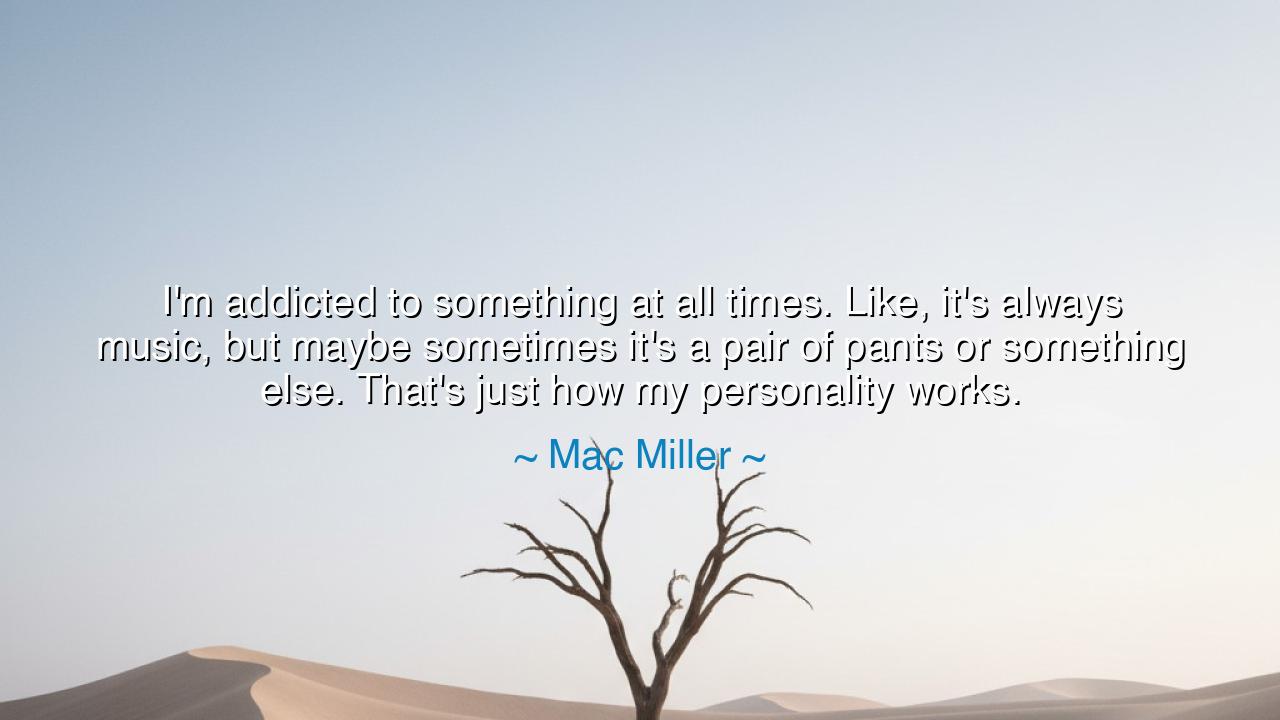
I'm addicted to something at all times. Like, it's always music
I'm addicted to something at all times. Like, it's always music, but maybe sometimes it's a pair of pants or something else. That's just how my personality works.






When the poet and musician Mac Miller confessed, “I’m addicted to something at all times. Like, it’s always music, but maybe sometimes it’s a pair of pants or something else. That’s just how my personality works,” he was unveiling a truth that is both deeply personal and universally human: the restless hunger of the soul to cling to objects, passions, or habits that anchor it in the chaos of existence. His words are not merely about fashion or melody—they are about the yearning for attachment, the unending search for meaning and comfort in a world that is always shifting beneath our feet.
The ancients knew of this longing well. The Stoics warned against the tyranny of attachment, teaching that man should not chain his happiness to things beyond his control. Yet even they recognized the human impulse to fixate upon something—whether wealth, fame, or pleasure—as if by holding to it, one might silence the storms within. Mac’s words echo this timeless struggle: though he poured himself into music, he admitted that his spirit always sought new anchors, new obsessions, for such was the pattern of his being.
History bears witness to others who lived by this restless drive. Consider Beethoven, who became consumed by his work as his deafness deepened. The music was not only his vocation but his obsession—his very survival. Yet at times, his letters reveal how he clung to small possessions or routines, just as Mac Miller speaks of his own habits. These addictions, whether noble or trivial, were the scaffolding that held a tormented soul together, giving shape to life when all else seemed uncertain.
The meaning of Mac’s confession is profound: it is not always grand passions that sustain us, but sometimes small fixations—the song on repeat, the favorite garment, the ritual cup of coffee. These things may seem insignificant, yet they reflect the deeper truth that the human heart cannot drift untethered. It seeks constancy, whether in art or in objects, to steady itself against the great tide of existence. In music, Mac found the truest anchor, but he admitted with honesty that his nature would always be drawn to something—some obsession, some flame to circle around.
This wisdom is both caution and comfort. It warns us that unchecked addiction can become a prison, consuming the self rather than sustaining it. Yet it also comforts us with the truth that passion, even obsession, can fuel creation and joy. The difference lies in whether we are ruled by these attachments or whether we wield them with awareness. Mac’s words reveal both his gift and his struggle: his relentless devotion to music gave the world his art, but his restless seeking also marked the fragility of his journey.
The lesson for us is clear: we must be mindful of the fires we feed. Let your obsessions be those that build you, not those that break you. Pour your intensity into crafts, into study, into kindness, into the pursuit of beauty. Recognize that your personality may crave anchors, but choose anchors that lift your spirit rather than weigh it down. For passion is a great servant but a cruel master, and it is only through wisdom that we can turn addiction into artistry, fixation into strength.
Practical wisdom follows. When you find yourself restless, choose deliberately what you will give your energy to. Create habits of growth rather than decline. If you must be addicted—as so many souls are—be addicted to learning, to creating, to loving, to building. Guard yourself from the traps of empty obsession, but embrace the passions that bring forth your best self. And remember always that even in small things, like a pair of pants, there may lie a reminder of who you are and how your soul finds comfort.
Therefore, let us hold Mac Miller’s words as both testimony and teaching: “I’m addicted to something at all times… that’s just how my personality works.” For in this, we see the restless truth of human nature: the need to cling, the hunger to create, the yearning to be anchored. Let us choose our obsessions wisely, so that what binds us may also bless us, and what consumes us may also give light to others.






AAdministratorAdministrator
Welcome, honored guests. Please leave a comment, we will respond soon